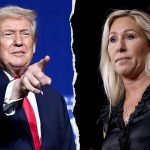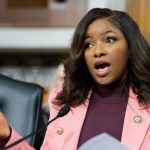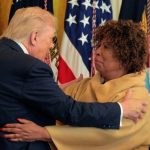It has long been an unwritten rule of the Catholic Church that no citizen of a world superpower can be pope.
The informal logic is that such an arrangement would risk putting preeminent temporal and spiritual authority into the hands of the same clan. It is always safer to pick a pope from a more quaint, less powerful country.
But at the most unexpected moment, the College of Cardinals broke this understanding by electing the first American pontiff in a line of succession more than 2,000 years old, stretching right back to Christ’s selection of St. Peter.
When Pope Leo XIV, formerly known as Cardinal Robert Prevost, emerged as the bishop of Rome on May 8, jaws dropped to the cobbled pavement of Vatican City.
The Catholic Church is among the oldest thriving institutions in history. Even in secular society and among nonbelievers, the Holy See enjoys unparalleled prestige that dwarfs other religious leaders and most monarchies. Its mission to spread the Gospel message gives it a character that transcends the coarseness of politics. The Catholic Church is stability personified.
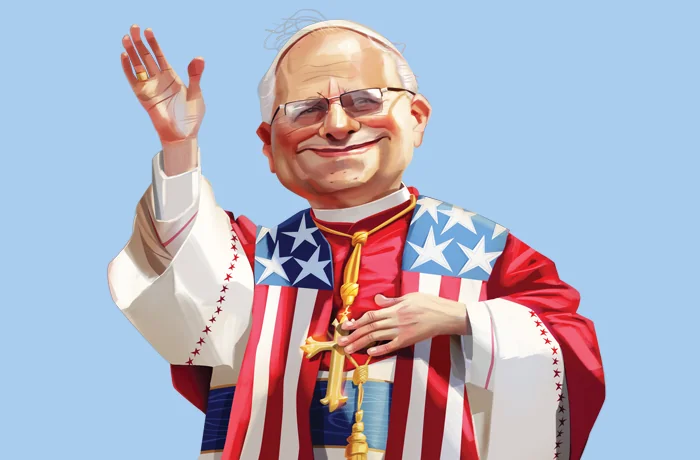
The election of the first American pope coincides with President Donald Trump returning to power. This is perhaps a mere coincidence but a significant coincidence nevertheless.
Trump, whose superpower is a talent for self-advertisement, forced all eyes worldwide to turn to watch America and what is happening here. Then, the church chose Leo to lead it, and the American focus of our time was suddenly underlined.
The president is a nationalist who vows to “Make America Great Again.” He won the Catholic vote in 2024. But the church is a global institution, not a national one. Trump and his most fervent supporters cast a skeptical eye on globalism and globalization.
There is much speculation about why the cardinals selected a Chicago-born prelate to lead them at this moment, when Trump is reasserting American power and fighting to build or restore the power of the presidency itself.
Initially, the anti-Trump media predictably spun the election of Leo into a rebuke of the White House, with the cardinals selecting a gladiator to battle against American nationalism.
But that narrative is quickly falling apart. The only evidence produced for it was past retweets and social media posts advocating “sensible gun control laws” and questioning Trump’s rhetoric on immigration.
If the College of Cardinals simply wanted an American pope whose views would clash with Trump’s, there were more fitting candidates.
Something else seems to have been at work — something that is less about standing athwart Trump’s pursuit of power and American greatness and more about building bridges where possible.
It is a fool’s errand to contemplate the Catholic Church and its supreme pastor within a secular political framework. Dichotomies such as “right-wing” and “left-wing” mean little to an institution that predates the discipline of political science by nearly two millennia.
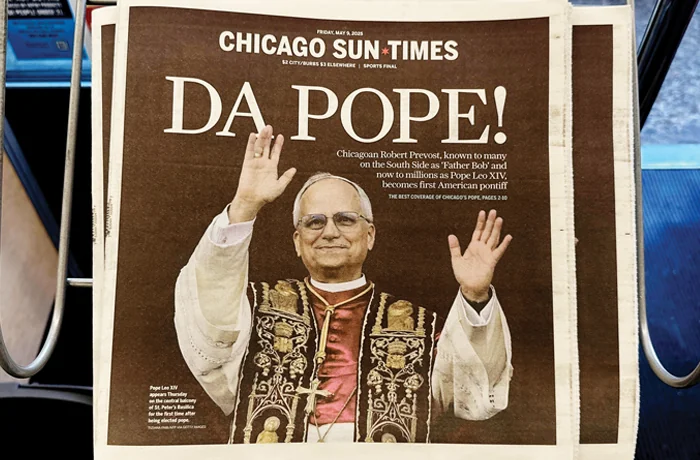
When the world is thinking in weeks, the church is thinking in centuries.
Trump was asked in the days leading up to the conclave who he would like to see elected pope. His first answer was an inevitable joke: He said he would be a good pope himself. His second answer mentioned Cardinal Timothy Dolan of New York.
Dolan, a jovial Irishman who has pastored the massive New York archdiocese since 2009, is perhaps the most powerful cardinal in America. He knows Trump personally and has cordial relations with him. He delivered a benediction at both Trump inaugurations, in 2017 and 2025, and he has been photographed many times buddying up with the president at public events such as the Al Smith Dinner.
But Dolan is not a toady of the White House. Among the “anti-Trump” social media activity attributed to then-Cardinal Prevost was his retweeting of an article by Dolan titled “Why Donald Trump’s anti-immigrant rhetoric is so problematic.”
Speaking to reporters after the conclave, Dolan called the president’s recent AI-generated image of himself as pope a brutta figura — Italian for “ugly figure” or “bad impression.”
Several Italian news outlets identified Dolan as playing a pivotal role in the conclave and securing votes for Prevost among his fellow Americans and other English-speaking cardinals from countries that were once part of the British Empire.
The finer points of discussions that happen in conclave are kept secret under oath, but heading into the election, “stability” was said to be the word on every cardinal’s lips.
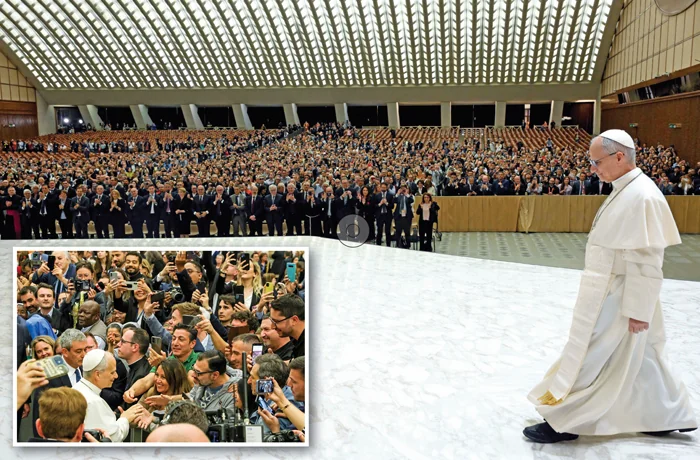
“When we went in there Wednesday afternoon, I think most people had a clean, clear idea about the candidate that they wanted — and it didn’t take that long,” Dolan said after the election of Leo.
The new pope’s solemn and sober demeanor is immediately obvious. He is calm, controlled, and pastoral.
He speaks in a soft and steady tone, with more of a flourish when talking about Christ, but shows a more passive voice on matters of the temporal world. Thus far, he has rarely spoken without prepared remarks.
In his first address to members of the media in Paul VI Audience Hall, Leo urged news figures to exercise restraint in their language and to escape the Tower of Babel created by polarized, hostile discourse.
“We do not need loud, forceful communication but rather communication that is capable of listening and gathering the voices of the weak who have no voice,” he said. “Let us disarm words. Let us disarm words, and we will help the world disarm. Disarming communication will allow us to share events of the world and to act in a manner consistent with our human dignity.”
Leo said he chose his name to echo the last pope of the 19th century, Pope Leo XIII. He led the church during a time of political, social, and economic revolutions as the world hurtled toward modernization and industrialization. His papacy offered spiritual stability amid the breakdown of feudal-era political systems.
Leo XIV suggested he believes the digital revolution is comparable, as a development with just as much consequence to human life as the industrial revolution. He has acknowledged the benefits of artificial intelligence but has cautioned the world to recognize that it poses “new challenges for the defense of human dignity, justice, and labor.”
This theological orthodoxy and clear view of the likelihood of exploitation is a marked contrast to the AI-loving, crypto-dealing, IVF-championing politics of Trump.
Where the secular world accelerates into the unknown, the Catholic Church is meant to pump the brakes and remind us all of eternal truths that no new technology should be allowed to obscure.
Trump did not respond to Leo’s election as though the church had just chosen a new rival to challenge him. Instead, the president savored the “honor” of an American citizen sitting on the throne.
“Congratulations to Cardinal Robert Francis Prevost, who was just named Pope,” Trump wrote on Truth Social following Leo’s ascension. “It is such an honor to realize that he is the first American Pope.”
“What excitement, and what a Great Honor for our Country,” he continued. “I look forward to meeting Pope Leo XIV. It will be a very meaningful moment!”
Trump was elected to improve the lives of average citizens and resuscitate traditional American culture, which has been gutted by hostile secular leftist forces. Many of his allies in America and abroad see their mission as restoring Western civilization. Vice President JD Vance is prominent in pushing this theme of Trump’s presidency.
Vance converted to Catholicism in 2019 after years of spiritual wanderings that began in the evangelical theology of his youth. His faith plays a prominent role in his decision-making, and he frequently cites Catholic intellectual tradition in his remarks.
His is not a unique story among modern conservatives.
Christianity’s role in public life is diminished compared to the founding of the country, which was at a time when state churches were common in many countries and atheism was scandalous. Vance lamented “where Western civilization has gone” during an address at the Heritage Foundation last month, asserting that “the Christian faith” is among the “very founding ideas of the West” that “all Western nations were in some important respect really based on in their original charter.”
Voters never decided or agreed to cast the church or religion out of the public square, he argued. That was the work of elites who no longer appreciated their cultural inheritance.
“Those very ideas have not just fallen out of favor, and they’re not just less popular than they were 200 years ago or 300 years ago; of course, in the case of our friends in Europe, a thousand years ago,” Vance said. “What we’ve seen is that those ideas have become disfavored [by] the ruling elite of the societies.”
Now, Americans of all religious backgrounds and of widely differing political beliefs are embracing the American pope.
Social media is abuzz with speculation about whether Leo has shopped at Costco and how many times he’s visited a Buc-ee’s.
The pope’s favorite baseball team, the Chicago White Sox, congratulated the pontiff on its jumbotron following his election. Fans are showing up at Rate Field in fake liturgical vestments and mitres. On the East Coast, the Phillie Phanatic threw on papal robes as he stepped out for the audience.
The president of Villanova University, of which Leo is an alumnus, said he was “getting so many congratulations” that “you would think I became the pope.”
A bipartisan group of lawmakers from over a dozen states is pushing a resolution in Congress that would officially recognize and celebrate Leo as “the 267th pontiff of the Holy Roman Catholic Church” and “the first American pontiff.”
The 19th-century political philosopher Alexis de Tocqueville, a French diplomat who traveled the early United States and documented sociological phenomena, reflected on the nature of liberty and religion in the New World.
In his estimation, the contrasting forces of liberty and historical Christianity were slowly but constantly pulling Americans in opposite directions.
“Our descendants will increasingly divide into only two parts, some leaving Christianity entirely and others embracing the Church of Rome,” he wrote.
Trump has reiterated his desire to meet with Leo soon. Vance is attending the pope’s inauguration Mass. Formal requests have already been filed asking for an invitation to be made for the pontiff to speak in Congress.
VATICAN UNVEILS POPE LEO XIV’S COAT OF ARMS, OFFICIAL PORTRAIT
The U.S. is probably not on the verge of a mass conversion to Catholicism. But the sight of the Old World’s most ancient honor being conferred on a son of the Midwest is compelling even, perhaps especially, to the citizens of the world’s preeminent power.
Tocqueville might have been right. But perhaps he did not account for the Church of Rome extending a hand to help pull Americans in.
Timothy Nerozzi is the foreign affairs reporter for the Washington Examiner.


